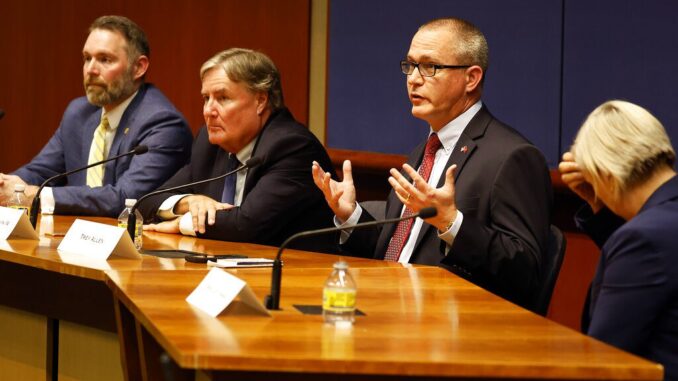
RALEIGH — While Republicans fell one seat shy of locking in supermajorities in both chambers of the General Assembly, the party did celebrate a full sweep of the state’s top judicial races.
The wins line up with multiple polls before Election Day that had all Republican candidates in the lead. In the month leading up to the election, super PACs spent more than $9 million in ads in support and opposition of the candidates in the Supreme Court races.
As of the morning of Nov. 14, voting data shows judicial race candidates received some of the highest vote totals of all races on the Nov. 8 ballot.
Court of Appeals Chief Judge Donna Stroud received more than 2 million votes — the highest of any candidate on the Nov. 8 ballot, surpassing both U.S. Senate candidates.
The two N.C. Supreme Court wins by Republicans Richard Dietz and Trey Allen mean the court’s makeup will go from a 4-3 Democrat majority to a 5-2 Republican majority.
Dietz defeated Democrat Lucy Inman by more than 192,000 votes or roughly 5% of the ballots cast in that race.
Democrats in North Carolina typically bring in higher absentee ballot numbers, which gave Inman an early lead. Inman won Absentee One-Stop (early voting) and Absentee By Mail but neither she nor any other Democrat had overly large early vote leads. Dietz exceeded Inman on in-person Election Day votes by more than 338,000 votes.
A look at the returns by county shows Dietz taking 82 out of the state’s 100 counties to Inman’s 18; Bertie, Buncombe, Chatham, Cumberland, Durham, Edgecombe, Forsyth, Guilford, Halifax, Hertford, Hoke, Mecklenburg, Northampton, Orange, Vance, Wake, Warren and Watauga.
This is the second failed Supreme Court attempt in consecutive election cycles for Inman. In 2020, she lost to Associate Justice Phil Berger by a slim margin of 1.34%. In that race, Inman won 26 counties.
Allen defeated incumbent Associate Justice Sam Ervin by more than 177,470 votes, a margin of more than 5.75% of ballots cast in that race. Allen exceeded Ervin on in-person Election Day votes by more than 333,870.
At the county level, Ervin won 19 while Allen won 81. Ervin won the same counties as Inman plus Pitt County.
Court of Appeals races also mirrored the sweep by Republicans in the previous 2020 election cycle.
Chief Justice Donna Stroud won reelection as did current COA Judge John Tyson. Newcomers Julee Flood and Michael Stading also firmly defeated their opponents.
Flood defeated Democrat Carolyn Thompson by more than 5% of the vote. Similar to the Supreme Court races, Thompson did not have an overwhelming early vote lead but did have an advantage in the Absentee By Mail.
Flood won 81 counties and Thompson took 19 counties.
The 19 won by Thompson include Bertie, Buncombe, Chatham, Cumberland, Durham, Edgecombe, Forsyth, Guilford, Halifax, Hertford, Hoke, Mecklenburg, Northampton, Orange, Vance, Wake, Warren, Watauga and Pitt.
Stroud took 83 counties and Salmon took 17 counties, the same ones as Thompson minus Pitt and Watauga.
In Absentee One-Stop ballots, Stroud and Salmon were separated by around 2,600 votes. Overall, Stroud received more than 338,800 more votes than Salmon and, on Election Day, she took in 400,687 more votes than Salmon.
Tyson took 83 counties and Adams took the same 19 counties won by Thompson. Tyson won the Election Day vote by more than 348,500 ballots.
In the matchup between Jackson and Stading, Jackson took the same 19 counties as Thompson garnered while Stading won the remaining 81 counties.
Stading ended up with a more than 353,5000 in-person Election Day vote advantage over Jackson. In early voting and voting by mail, Jackson had sizeable leads over Stading.
When looking at county-level wins, the Democratic candidate wins fell short of the 28 counties won by Gov. Roy Cooper during both his 2016 run and his 2020 reelection.
All six Republicans running for the state’s two top courts had banded together in 2021 to run as a slate.
In 2019, the N.C. Republican Party formed the Judicial Victory Fund to raise funds for statewide conservative judicial candidates. In the following year’s election, Republican candidates made a clean sweep of the three N.C. Supreme Court seats and five Court of Appeals seats.
A slim margin of just over 400 votes separated Paul Newby from then-Chief Justice Cheri Beasley in the N.C. Supreme Court Chief Justice race. Beasley refused to concede and demanded a recount.
After a recount didn’t change the calculus in her favor, Beasley asked for a hand-eye recount which also did not put her in the lead. She finally conceded and Newby was certified as having won the race in mid-December 2020.
Newby was installed at the 30th N.C. State Chief Justice on Jan. 1, 2021.

